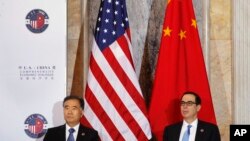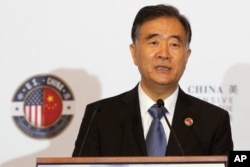Talks aimed at breaking down trade barriers between the United States and China appeared to hit a snag Wednesday in Washington, as the two sides canceled news conferences that were scheduled for the end of the meeting.
As the talks started in Washington, U.S. Treasury Secretary Steve Mnuchin called for "a more fair and balanced economic relationship" between the United States and China.
Chinese Vice Premier Wang Yang said trading cooperation between the two countries "is a realistic choice for both sides," but he warned "confrontation will immediately damage the interests of both."
Washington and Beijing govern the world's two biggest economies, but China sells more than $300 billion more to U.S. customers each year than American firms sell to China.
Analysts say domestic politics in both nations make it difficult for negotiators to make progress on trade issues. Derek Scissors of the American Enterprise Institute tells VOA that President Donald Trump's criticism of China during the election campaign means Washington has to press for significant concessions from Beijing in these talks. Scissors says the next step might be for the Trump administration to impose a tariff on steel or aluminum imports from China.
Meanwhile, Bookings Institution scholars David Dollar and Ryan Hass write that China's leadership cannot be seen as giving in to Washington in the run-up to the Party Congress, which is a major political event.
The U.S. Treasury chief said the U.S. and China had made progress earlier in their trade relations as a result of the April summit between Trump and Chinese President Xi Jinping, with China's markets being opened to U.S. beef processors and American credit-rating agencies gaining new information to assess the creditworthiness of Chinese corporations.





